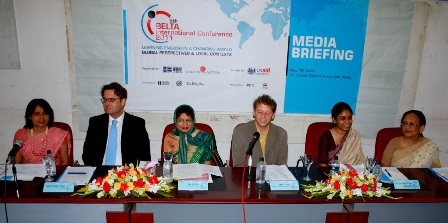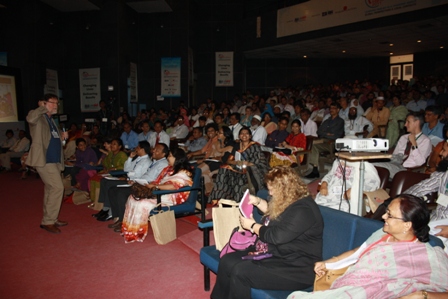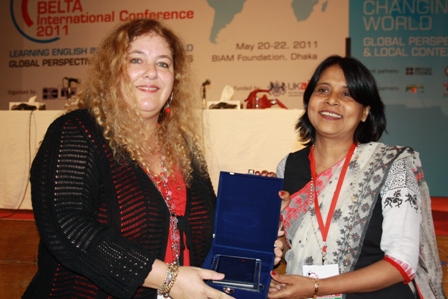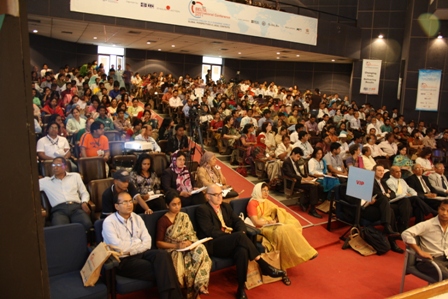|
The 5th BELTA International Conference 2011, with its theme “Learning English in a Changing World: Global Perspectives and Local Contexts,” was held May 20-22, 2011, at BIAM Foundation, Dhaka. It was organized jointly by Bangladesh English Language Teachers Association (BELTA) and English in Action (EIA) and sponsored by UKAid, the British Council, and the American Center.

The objective of the conference was to provide a platform for introducing new developments, discussing challenges, and sharing best practices and research findings in English language teaching and learning. More than 500 ELT professionals from mainstream education (primary to tertiary), language policy bodies, education boards, development organizations, and administration as well as freelance entrepreneurs, researchers, and writers took part in this 3-day paper-discussion-debate-packed forum. Participants came from all regions of the country as well as from overseas. There were 89 presentations―32 percent were from overseas (United Kingdom, United States, Australia, India, Pakistan, Nepal, Malaysia, Iran, Afghanistan, Middle East, Eastern Europe). The rest of the papers were from Bangladesh. All the papers reflected a medley of practice, research, and innovative approaches.
Among the presentations were
- Plenary papers by invited speakers on the major issues subsumed under the conference theme
- Papers reflecting new developments in ELT, classroom practice, and research findings
- Workshops linking theory and practice and involving the audience in hands-on activities
- Discussions/debates on issues such as managing classroom innovation in ELT and the role of teachers’ associations in professional development
- Poster presentations on online learning
Day 1: After the inaugural session on the first day, the keynote paper was presented by David Graddol, ELT expert on global English. His argument on the rising importance of English worldwide hinged on researched figures on the changing scenario in industry―the emphasis had shifted from agriculture through production to services in the current world. And services depended a great deal on effective communication, often among nonnative English speakers using English as the lingua franca. Here David Graddol showed clearly the need to learn/teach the English language in use, within contexts and role relationships, not English in a void, reflecting abstract grammar rules. The second highlight of Day 1 was the indomitable Jeremy Harmer, teacher educator and writer, who presented a highly entertaining but realistic presentation on teaching large classes and some ways of drawing all learners into engrossing classroom activities.

Day 2: The highlights of the second day covered a variety of issues―from ELT teacher development aspects, testing/assessment, and the use of technology in ELT down to a daring challenge on the use of CLT in Bangladesh. Amol Padwad, teacher educationist, presented a very interesting profile of the Indian ELT professional and the status of teacher development in India. Christine Coombe, assessment expert and President of TESOL, ran through the essential ingredients of reliable testing in ELT and the issues and challenges of second language teacher assessment literacy. Huw Jarvis, a technology expert in ELT, spoke on computers, globalization, and the digital native and issues related to ELT. Arifa Rahman took up cudgels against the inappropriate use of CLT in Bangladesh with a plea for classroom practitioners to understand the underlying principles of this communicative approach. The highlight of Day 2 was the panel debate moderated by Mike Solly on the use of classroom-based innovation in ELT. Panelists were from different fields and defended their own procedures while questions were raised about aspects of context and culture being major issues to be considered.

Day 3: The major papers on the final day focused on the use of literary texts and the environment by M. E. Vethamani while another strand looked at access and equity in education with relation to English language policy and practice by Sabiha Mansoor. The highlight of Day 3 was a panel discussion on the role of teachers’ associations in professional development, with TA participants from India, Pakistan, Bangladesh, Nepal, and Afghanistan. In addition, there were two book launchings, with four contributors and two publishers present for the occasion. The book titles were:
H. Coleman (Ed.). (2011). Dreams & Realities: Developing Countries and the English Language. London: The British Council.
L. Farrell, U. N. Singh, & R. A. Giri (Eds.). (2011). English Language Education in
South Asia: From Policy to Pedagogy. Delhi: Cambridge University Press.
Besides these topics, there were papers and presentations on innovative approaches in teacher development and classroom methodology undertaken by major ELT projects in-country: English in Action (EIA) and English for Teaching and Teaching for English (ETTE) for both urban and rural/marginalized areas. There were different models of learning and their application in classroom practices especially in promoting learner engagement, motivating, and exploring the fun element in learning. Technology played an important role and there were several papers on the use of mobile phones for learning English. Sociolinguistic aspects were also featured in the papers that researched code-switching and code-mixing and the use of FM radio language today. There were critiques of ELT materials used in state schools as well as a recognition of the need to develop academic reading, writing, and listening at the tertiary level. Pronunciation, rhythm, and intonation found a place and so did specialized papers on the teaching of young learners. In short, there was a fair mix of theory and practice with research findings, methodology, demonstrations, and application as well as an awareness of technology and context that made this conference worthwhile for all those who participated.

For more information on BELTA and the conference, please visit our Web site. |

